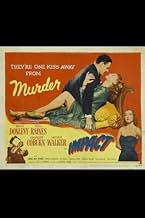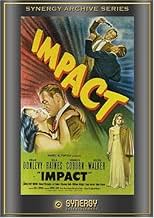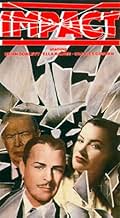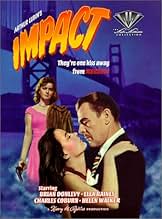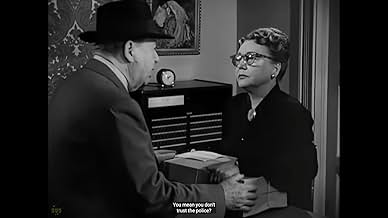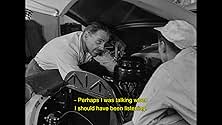CALIFICACIÓN DE IMDb
7.0/10
5.2 k
TU CALIFICACIÓN
Una esposa infiel conspira con su amante para matar a su marido, pero el amante es asesinado accidentalmente en su lugar. El marido se esconde y deja que acusen a su mujer de conspiración.Una esposa infiel conspira con su amante para matar a su marido, pero el amante es asesinado accidentalmente en su lugar. El marido se esconde y deja que acusen a su mujer de conspiración.Una esposa infiel conspira con su amante para matar a su marido, pero el amante es asesinado accidentalmente en su lugar. El marido se esconde y deja que acusen a su mujer de conspiración.
- Dirección
- Guionistas
- Elenco
Glen Vernon
- Ed
- (as Glenn Vernon)
Linda Leighton
- Telephone Operator
- (as Linda Johnson)
Jason Robards Sr.
- Judge
- (as Jason Robards)
Opiniones destacadas
Too bad the movie's a disappointing crime thriller after a promising start. Brian Donlevy plays a high-powered corporate executive with a lavish apartment and a silken wife (Helen Walker). Trouble is the doe-eyed Walker has teamed up with a low-class lover (Tony Barrett) to plot Donlevy's murder. When that fails, Donlevy finds himself stranded in a small Idaho town where he settles in with new girl friend Ella Raines. However, police are still trying to unravel what happened at failed murder site, so an unresolved cloud hangs over both Donlevy and wife Walker.
Strong opening that nicely sets up the melodrama and Donlevy's betrayal. Middle part is unusual for crime drama since it celebrates virtues of small town life. Yet, it does so fairly effectively, such that even a hard-charging executive like Donlevy would find welcome escape from city life and a faithless wife. Last third, however, settles into routine suspenser as Raines seeks evidence to clear Donlevy.
Though movie contains noirish elements, particularly spider-woman Walker and destiny-crossed Donlevy, director Lubin films in flat, uninspired fashion that adds nothing to the script. In fact, his approach tends to drain excitement from those parts that should have impact. For example, the business around the doomed car needs a few emotional close-ups to emphasize the cat-and-mouse stalking going on. Instead, Lubin's camera remains at an impersonal distance as if it's a family outing being filmed. The movie's entire texture appears better suited to a police docu-drama than that of a man menaced by unseen forces.
Casting too, amounts to a problem. Donlevy's a fine character actor who could bring off authority figures with real conviction. As a high-powered executive, he's excellent; as a romantic figure, he's about 10 years too old and not much good at softer emotions. Then too, having the comely and much younger Ella Raines quickly fall for him is something of a stretch. A bigger problem lies in framing Walker's lover as something of a low-life, without the charm or polish that would naturally attract a high-class woman of her social standing. The script would have been wise to imply that Walker is just using him to get rid of her husband. Just as unpersuasive is the casting of a geriatric (72 year-old) Charles Coburn as a cop, even if he does manage some finesse. All in all, the oddball casting just doesn't work.
An exception is Helen Walker who's perfectly suited to her role as the devious woman. Watch her array of expressions as the cops close in. Her career was unfortunately slowed down by a debilitating accident and she died much too early . Though largely forgotten today because of her few credits, once you see her, you don't forget her with her "upside down" eyes, statuesque bearing, and unforced beauty. She's unforgettable as Tyrone Power's scheming nemesis in Nightmare Alley and could do comedy equally well, as in the hilarious Murder, He Says (1945). In my little book, she could easily qualify as an actress with a cult following.
Too bad that an Anthony Mann, Robert Siodmak, or Andre deToth didn't get hold of the material before the pedestrian Lubin. The premise is prime material for noir treatment, and with more astute casting, might have become a classic.
Strong opening that nicely sets up the melodrama and Donlevy's betrayal. Middle part is unusual for crime drama since it celebrates virtues of small town life. Yet, it does so fairly effectively, such that even a hard-charging executive like Donlevy would find welcome escape from city life and a faithless wife. Last third, however, settles into routine suspenser as Raines seeks evidence to clear Donlevy.
Though movie contains noirish elements, particularly spider-woman Walker and destiny-crossed Donlevy, director Lubin films in flat, uninspired fashion that adds nothing to the script. In fact, his approach tends to drain excitement from those parts that should have impact. For example, the business around the doomed car needs a few emotional close-ups to emphasize the cat-and-mouse stalking going on. Instead, Lubin's camera remains at an impersonal distance as if it's a family outing being filmed. The movie's entire texture appears better suited to a police docu-drama than that of a man menaced by unseen forces.
Casting too, amounts to a problem. Donlevy's a fine character actor who could bring off authority figures with real conviction. As a high-powered executive, he's excellent; as a romantic figure, he's about 10 years too old and not much good at softer emotions. Then too, having the comely and much younger Ella Raines quickly fall for him is something of a stretch. A bigger problem lies in framing Walker's lover as something of a low-life, without the charm or polish that would naturally attract a high-class woman of her social standing. The script would have been wise to imply that Walker is just using him to get rid of her husband. Just as unpersuasive is the casting of a geriatric (72 year-old) Charles Coburn as a cop, even if he does manage some finesse. All in all, the oddball casting just doesn't work.
An exception is Helen Walker who's perfectly suited to her role as the devious woman. Watch her array of expressions as the cops close in. Her career was unfortunately slowed down by a debilitating accident and she died much too early . Though largely forgotten today because of her few credits, once you see her, you don't forget her with her "upside down" eyes, statuesque bearing, and unforced beauty. She's unforgettable as Tyrone Power's scheming nemesis in Nightmare Alley and could do comedy equally well, as in the hilarious Murder, He Says (1945). In my little book, she could easily qualify as an actress with a cult following.
Too bad that an Anthony Mann, Robert Siodmak, or Andre deToth didn't get hold of the material before the pedestrian Lubin. The premise is prime material for noir treatment, and with more astute casting, might have become a classic.
This film noir has three distinct movements. Brian Donlevy proves masterful at playing a high-powered executive, self-satisfied and in control. As in any good drama, his secure world is assaulted and turned upside down The film portrays his characters descent, loss of faith and subsequent redemption. Donlevy handles each of the stages well.
Helen Walker is brilliant as Donlevy's wife. Her ability to portray a duplicitous and homicidal spouse is immaculate in it's delivery.
I found great pleasure in watching the legal machinations and the ambivalence of the justice system.
More then anything, and I've commented on this in other film noir reviews, I enjoyed the street scenes of San Francisco a half century ago. Sometimes I think I'd be just as happy to forgo plot in favor of travelogue Also, Larkspur (whether it is in California or Idaho,) just seems like a fine little town the likes of which we now pine for. The volunteer fire department scene was reflective of my sense of small town values.
All in all, an absorbing,nostalgic and thought provoking piece of film art.
Helen Walker is brilliant as Donlevy's wife. Her ability to portray a duplicitous and homicidal spouse is immaculate in it's delivery.
I found great pleasure in watching the legal machinations and the ambivalence of the justice system.
More then anything, and I've commented on this in other film noir reviews, I enjoyed the street scenes of San Francisco a half century ago. Sometimes I think I'd be just as happy to forgo plot in favor of travelogue Also, Larkspur (whether it is in California or Idaho,) just seems like a fine little town the likes of which we now pine for. The volunteer fire department scene was reflective of my sense of small town values.
All in all, an absorbing,nostalgic and thought provoking piece of film art.
Whoever likes movies of the late Forties should not miss this one. It tells a typical film noir story that is coherent and easy to understand. Impact is a quite artful picture, obviously made by first rate professionals. The balance between location shooting (mainly in and around San Francisco) and the extraordinarily stylish sets is in my opinion perfect and well thought out. At the center of the story is the attempted killing of the main character by his wife's lover. The car with the two men drives at night along a sinuous mountain road. It slows down and stops because of a flat tyre. As the viewers already know, this is the spot where the murder should take place. With unbelievable ease the natural surroundings (reminding you of the dramatic climax in Hitchcock's Family Plot) change into an almost expressionistic stage set with artificial fog at the bottom and everything. It is an unforgettable moment. What the film people could achieve in those days!
Brian Donlevy has some very good moments. As after a phone call he fully realises that his wife who he naively loved (calling himself "Softy" in his messages to her) had cheated and betrayed him, he stumbles to a bench on a station platform, stares into the void with dim eyes and then starts crying with rage and frustration. The scene takes almost a minute and proves that Donlevy is a much underrated actor who should be honored more.
Apart from the realistic presentation of parts of San Francisco in the late Forties (it complements Welles impressions in Lady from Shanghai"), Impact has some nice pieces of slang (at least to a foreigner whose mother tongue is not English). "Grovel a shuteye" for "taking a nap", that's nice, isn't it?
Brian Donlevy has some very good moments. As after a phone call he fully realises that his wife who he naively loved (calling himself "Softy" in his messages to her) had cheated and betrayed him, he stumbles to a bench on a station platform, stares into the void with dim eyes and then starts crying with rage and frustration. The scene takes almost a minute and proves that Donlevy is a much underrated actor who should be honored more.
Apart from the realistic presentation of parts of San Francisco in the late Forties (it complements Welles impressions in Lady from Shanghai"), Impact has some nice pieces of slang (at least to a foreigner whose mother tongue is not English). "Grovel a shuteye" for "taking a nap", that's nice, isn't it?
A good example of a little known "film noir," this 1949 film was shot primarily on location in San Francisco.
There is good acting all around, from the main stars down to supporting cast, and the plot does tie together nicely.
Look for Mae Marsh, a silent film star who plays Ella Raines mother, and also look for a brief cameo appearance by syndicated columnist and radio personality Sheila Graham, playing herself of course.
Brian Donlevy, who made similar "noir" films, among them D.O.A., appears to be right at home in this film, and is wonderful in an understated way.
The film, at almost 2 hours in length was a bit long for the time, and might drag a bit, but is worth watching.
Anna Mae Wong plays the maid in this film, an old time character actress from the days of silent films, she has a small but all important role in the film, for she holds the key (literally) to how the whole movie ends. Listen for some degrading Chinese music when Ms. Wong is on the run.
Interesting note, Helen Walker who plays the scheming wife in the film, was involved in a major scandal of her own. On New Years Eve, 1946, she was driving home some hitchhiking soldiers near Redlands, California. Walker, apparently drunk at the wheel, got into a car accident in which one of the soldiers was killed and the other two badly injured. Though in the end exonerated of any guilt from the accident, it seemed to plague her for the rest of her life, and she slipped deeper and deeper into depression.
There is good acting all around, from the main stars down to supporting cast, and the plot does tie together nicely.
Look for Mae Marsh, a silent film star who plays Ella Raines mother, and also look for a brief cameo appearance by syndicated columnist and radio personality Sheila Graham, playing herself of course.
Brian Donlevy, who made similar "noir" films, among them D.O.A., appears to be right at home in this film, and is wonderful in an understated way.
The film, at almost 2 hours in length was a bit long for the time, and might drag a bit, but is worth watching.
Anna Mae Wong plays the maid in this film, an old time character actress from the days of silent films, she has a small but all important role in the film, for she holds the key (literally) to how the whole movie ends. Listen for some degrading Chinese music when Ms. Wong is on the run.
Interesting note, Helen Walker who plays the scheming wife in the film, was involved in a major scandal of her own. On New Years Eve, 1946, she was driving home some hitchhiking soldiers near Redlands, California. Walker, apparently drunk at the wheel, got into a car accident in which one of the soldiers was killed and the other two badly injured. Though in the end exonerated of any guilt from the accident, it seemed to plague her for the rest of her life, and she slipped deeper and deeper into depression.
The silvery Packard convertible Brian Donlevy drives is one of the most beautiful cars I've ever seen. It's basically all I'd remembered from years ago when a local a cable channel that no longer shows old movies ran a bad print of this from time to time.
Donlevy is not an exciting actor but he is fine. He plays an industrialist madly in love with his wife, who is not worthy of his devotion (to say the least.) She is played by Helen Walker, a specialist at cold, intelligent, sleek women. (She's the best part of "Nightmare Alley.") We also have Charles Coburn as a detective and Ella Raines as a girl who wants to help cuckolded Donlevy out of a predicament I can't reveal. (But remember: This is a film noir.) In her early scenes, Raines smiles too much and looks like an ad for gum. (And speaking of ads, yikes! This has one of the earliest examples of product placement: Someone offers Donlevy a Coke and for quite a while, in the foreground, is a Coca-Cola machine!) Also on hand is Mae Marsh as Walker's mother. She looks great and is very good. And Anna May Wong, one of Hollywood's greatest, most poorly used stars, is fourth-billed as Donlevy and Walker's maid.
The movie is not exactly suspenseful but it's a solid piece of work. The acting ranges from good to excellent and the plot, though it wanders a bit from time to time, is intriguing. It's also unusually literate: The characters speak in impeccable (though never stilted) English.
Donlevy is not an exciting actor but he is fine. He plays an industrialist madly in love with his wife, who is not worthy of his devotion (to say the least.) She is played by Helen Walker, a specialist at cold, intelligent, sleek women. (She's the best part of "Nightmare Alley.") We also have Charles Coburn as a detective and Ella Raines as a girl who wants to help cuckolded Donlevy out of a predicament I can't reveal. (But remember: This is a film noir.) In her early scenes, Raines smiles too much and looks like an ad for gum. (And speaking of ads, yikes! This has one of the earliest examples of product placement: Someone offers Donlevy a Coke and for quite a while, in the foreground, is a Coca-Cola machine!) Also on hand is Mae Marsh as Walker's mother. She looks great and is very good. And Anna May Wong, one of Hollywood's greatest, most poorly used stars, is fourth-billed as Donlevy and Walker's maid.
The movie is not exactly suspenseful but it's a solid piece of work. The acting ranges from good to excellent and the plot, though it wanders a bit from time to time, is intriguing. It's also unusually literate: The characters speak in impeccable (though never stilted) English.
¿Sabías que…?
- TriviaThe building that served as the exterior of Sue Lin's apartment is 834 Washington St., San Francisco, CA. It still stands as of this writing (04/2019) almost completely intact. There is a business on the ground floor, but the three floors above it remain, and nearly all the adornments remain. (It can be viewed on Google maps, street view.)
- ErroresThe end credits list the name of the character played by Mae Marsh as "Mrs. Peters"; Marsh played the mother of the gas station owner. The only time the mother's name is mentioned in the film is when Walter Williams first comes to the house for supper, and he calls her "Mrs. King". Marsha Peters (the gas station owner) and her mother would not have had the same last name, since Marsha explains when she first meets Walter that her husband was killed in World War II.
When this movie was made, and in the small town where this character lived, a woman would not have kept her maiden name when marrying or returned to it after being widowed. She would have remained Mrs. Peters unless she remarried.
- Citas
Lt. Tom Quincy: Are you Ah Sing? Understand? You understandee English?
Ah Sing: [nodding and speaking in perfect English] Also French, Italian, and Hebrew.
- ConexionesEdited into The Green Fog (2017)
Selecciones populares
Inicia sesión para calificar y agrega a la lista de videos para obtener recomendaciones personalizadas
- How long is Impact?Con tecnología de Alexa
Detalles
- Fecha de lanzamiento
- País de origen
- Idiomas
- También se conoce como
- Impact
- Locaciones de filmación
- Larkspur, California, Estados Unidos(Larkspur, Idaho)
- Productoras
- Ver más créditos de la compañía en IMDbPro
Taquilla
- Presupuesto
- USD 900,000 (estimado)
- Tiempo de ejecución1 hora 51 minutos
- Color
- Relación de aspecto
- 1.33 : 1
Contribuir a esta página
Sugiere una edición o agrega el contenido que falta

Principales brechas de datos
By what name was Impacto (1949) officially released in India in English?
Responda


